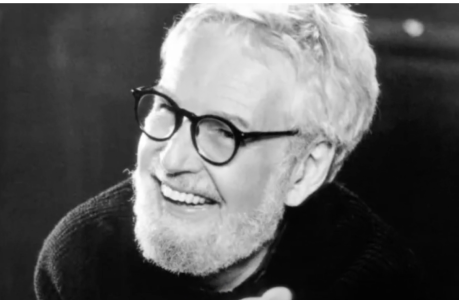Hollywood legend behind "Kramer vs. Kramer" dies at 92—how Robert Benton’s stories reshaped modern cinema
By
Veronica E.
- Replies 0
If you grew up watching classic American films or simply appreciate a powerful story told with grace, the name Robert Benton might spark a quiet sense of reverence.
While he wasn’t a flashy Hollywood celebrity, his work spoke volumes—and helped redefine how stories were told on the big screen.
Benton, the Oscar-winning writer and director of Kramer vs. Kramer and co-writer of Bonnie and Clyde, passed away at his Manhattan home this week. He was 92.
At The GrayVine, we believe in honoring the storytellers who helped shape not just cinema, but culture.
Robert Benton wasn’t driven by spectacle. He brought heart, humanity, and honesty to the screen—offering audiences stories that still resonate decades later.
Let’s take a look at how this quiet visionary helped transform Hollywood and left behind a body of work worth remembering.

From small-town Texas to the silver screen
Born in 1932 in Waxahachie, Texas, Benton grew up far from the glamour of Hollywood.
His father worked for the telephone company, but what left a lasting impression were the family trips to the local movie theater.
That early love for film eventually took Benton to the University of Texas, Columbia University, and later into the Army.
But filmmaking didn’t come immediately.
In the 1960s, Benton began as an art director for Esquire magazine.
There, he helped launch the Dubious Achievement Awards and even dated a young Gloria Steinem.
More importantly, it’s where he met David Newman, and together they wrote a film that would shake up an entire industry.
Also read: Gene Hackman’s tragedy reveals the silent killer in your home–What you need to know about this virus right now.
Breaking boundaries with Bonnie and Clyde
In the mid-1960s, Hollywood was playing it safe—cranking out predictable films that felt disconnected from real life.
Benton and Newman, drawing inspiration from European cinema and real-life Depression-era outlaws, took a bold leap.
Their script for Bonnie and Clyde (1967) stunned audiences with its gritty realism and complex characters.
Directed by Arthur Penn and starring Warren Beatty and Faye Dunaway, the film introduced a new kind of storytelling—one that embraced imperfection, moral ambiguity, and raw emotion.
It challenged Hollywood norms and influenced a wave of iconic directors like Martin Scorsese and Francis Ford Coppola.
And though some details from the original script, including Clyde’s bisexuality, were softened before release, its daring spirit remained unmistakable.
Also read: “Twin Peaks” mastermind and filmmaking legend David Lynch passes away
Oscar wins and emotional truths: Kramer vs. Kramer and Places in the Heart
Benton’s success didn’t stop at screenwriting.
He stepped behind the camera and made history with Kramer vs. Kramer (1979), a deeply personal and emotional portrayal of a fractured family.
Starring Dustin Hoffman and Meryl Streep, the film offered an honest look at divorce and fatherhood at a time when those topics were rarely explored so intimately on screen.
The film swept the Academy Awards, winning five Oscars—including Best Picture and two for Benton: Best Director and Best Adapted Screenplay.
Just a few years later, Benton earned more acclaim for Places in the Heart (1984), which drew on his own family’s experiences during the Great Depression.
Sally Field won an Oscar for her role, famously telling the world, "You like me, right now, you like me!"—a moment full of the sincerity Benton so often brought to his work.
Source: X / @FOX61News
Also read: Sad News for “Beverly Hills Cop” fans: Iconic Star John Ashton Passes Away at 76
An actor’s director and literary storyteller
Despite struggling with severe dyslexia as a child, Benton developed a reputation for adapting complex novels and bringing out unforgettable performances from his actors.
He worked with literary heavyweights like Philip Roth (The Human Stain), E.L. Doctorow (Billy Bathgate), and Richard Russo (Nobody’s Fool), and earned the respect of some of Hollywood’s most celebrated performers.
Dustin Hoffman credited Benton with reigniting his passion for acting, and Sally Field’s famous Oscar speech still echoes as a testament to the emotional connection he fostered on set.
Even Paul Newman earned his final Oscar nomination under Benton’s direction.
Not every film a blockbuster—but always heartfelt
Of course, not every project was a hit.
Films like Billy Bathgate, Twilight, and The Human Stain didn’t enjoy the same success as his earlier work.
Still, Benton’s quiet commitment to authentic, human stories never wavered.
He once described the Academy Awards as a kind of “family reunion”—a place of warmth, connection, and shared passion. "It’s home," he said. "And home is what I’ve spent my life looking for."
Robert Benton may be gone, but his influence lives on.
He helped prove that films can be meaningful without being preachy, emotional without being manipulative, and entertaining without losing depth.
His work opened the door for stories that weren’t afraid to be real—and that kind of storytelling never goes out of style.
Whether you first saw Bonnie and Clyde in a crowded theater or found comfort in Kramer vs. Kramer during a tough time in your own life, Benton’s films remain cinematic touchstones.
Read next: Steve “Mongo” McMichael, football legend and Hall of Famer, dies at 67

Which Robert Benton film had the biggest impact on you? Did Kramer vs. Kramer remind you of someone in your life? Or maybe you remember the shock of seeing Bonnie and Clyde for the first time? We’d love to hear your thoughts—share your memories in the comments below!
While he wasn’t a flashy Hollywood celebrity, his work spoke volumes—and helped redefine how stories were told on the big screen.
Benton, the Oscar-winning writer and director of Kramer vs. Kramer and co-writer of Bonnie and Clyde, passed away at his Manhattan home this week. He was 92.
At The GrayVine, we believe in honoring the storytellers who helped shape not just cinema, but culture.
Robert Benton wasn’t driven by spectacle. He brought heart, humanity, and honesty to the screen—offering audiences stories that still resonate decades later.
Let’s take a look at how this quiet visionary helped transform Hollywood and left behind a body of work worth remembering.

Oscar-winning filmmaker Robert Benton, whose stories brought emotional depth and realism to the silver screen. Image Source: YouTube / Gone But Known.
From small-town Texas to the silver screen
Born in 1932 in Waxahachie, Texas, Benton grew up far from the glamour of Hollywood.
His father worked for the telephone company, but what left a lasting impression were the family trips to the local movie theater.
That early love for film eventually took Benton to the University of Texas, Columbia University, and later into the Army.
But filmmaking didn’t come immediately.
In the 1960s, Benton began as an art director for Esquire magazine.
There, he helped launch the Dubious Achievement Awards and even dated a young Gloria Steinem.
More importantly, it’s where he met David Newman, and together they wrote a film that would shake up an entire industry.
Also read: Gene Hackman’s tragedy reveals the silent killer in your home–What you need to know about this virus right now.
Breaking boundaries with Bonnie and Clyde
In the mid-1960s, Hollywood was playing it safe—cranking out predictable films that felt disconnected from real life.
Benton and Newman, drawing inspiration from European cinema and real-life Depression-era outlaws, took a bold leap.
Their script for Bonnie and Clyde (1967) stunned audiences with its gritty realism and complex characters.
Directed by Arthur Penn and starring Warren Beatty and Faye Dunaway, the film introduced a new kind of storytelling—one that embraced imperfection, moral ambiguity, and raw emotion.
It challenged Hollywood norms and influenced a wave of iconic directors like Martin Scorsese and Francis Ford Coppola.
And though some details from the original script, including Clyde’s bisexuality, were softened before release, its daring spirit remained unmistakable.
Also read: “Twin Peaks” mastermind and filmmaking legend David Lynch passes away
Oscar wins and emotional truths: Kramer vs. Kramer and Places in the Heart
Benton’s success didn’t stop at screenwriting.
He stepped behind the camera and made history with Kramer vs. Kramer (1979), a deeply personal and emotional portrayal of a fractured family.
Starring Dustin Hoffman and Meryl Streep, the film offered an honest look at divorce and fatherhood at a time when those topics were rarely explored so intimately on screen.
The film swept the Academy Awards, winning five Oscars—including Best Picture and two for Benton: Best Director and Best Adapted Screenplay.
Just a few years later, Benton earned more acclaim for Places in the Heart (1984), which drew on his own family’s experiences during the Great Depression.
Sally Field won an Oscar for her role, famously telling the world, "You like me, right now, you like me!"—a moment full of the sincerity Benton so often brought to his work.
Source: X / @FOX61News
Also read: Sad News for “Beverly Hills Cop” fans: Iconic Star John Ashton Passes Away at 76
An actor’s director and literary storyteller
Despite struggling with severe dyslexia as a child, Benton developed a reputation for adapting complex novels and bringing out unforgettable performances from his actors.
He worked with literary heavyweights like Philip Roth (The Human Stain), E.L. Doctorow (Billy Bathgate), and Richard Russo (Nobody’s Fool), and earned the respect of some of Hollywood’s most celebrated performers.
Dustin Hoffman credited Benton with reigniting his passion for acting, and Sally Field’s famous Oscar speech still echoes as a testament to the emotional connection he fostered on set.
Even Paul Newman earned his final Oscar nomination under Benton’s direction.
Not every film a blockbuster—but always heartfelt
Of course, not every project was a hit.
Films like Billy Bathgate, Twilight, and The Human Stain didn’t enjoy the same success as his earlier work.
Still, Benton’s quiet commitment to authentic, human stories never wavered.
He once described the Academy Awards as a kind of “family reunion”—a place of warmth, connection, and shared passion. "It’s home," he said. "And home is what I’ve spent my life looking for."
Robert Benton may be gone, but his influence lives on.
He helped prove that films can be meaningful without being preachy, emotional without being manipulative, and entertaining without losing depth.
His work opened the door for stories that weren’t afraid to be real—and that kind of storytelling never goes out of style.
Whether you first saw Bonnie and Clyde in a crowded theater or found comfort in Kramer vs. Kramer during a tough time in your own life, Benton’s films remain cinematic touchstones.
Read next: Steve “Mongo” McMichael, football legend and Hall of Famer, dies at 67
Key Takeaways
- Oscar-winning filmmaker Robert Benton, best known for co-writing Bonnie and Clyde and directing Kramer vs. Kramer, has died at age 92 in Manhattan.
- Benton won three Academy Awards during his career, including Best Director and Best Adapted Screenplay for Kramer vs. Kramer, and Best Original Screenplay for Places in the Heart.
- Despite struggling with severe dyslexia, Benton built a successful Hollywood career adapting novels and directing acclaimed films.
- Benton’s work left a lasting impact on American cinema, and he was widely respected by actors and filmmakers for his collaborative spirit and dedication to storytelling.
Which Robert Benton film had the biggest impact on you? Did Kramer vs. Kramer remind you of someone in your life? Or maybe you remember the shock of seeing Bonnie and Clyde for the first time? We’d love to hear your thoughts—share your memories in the comments below!






